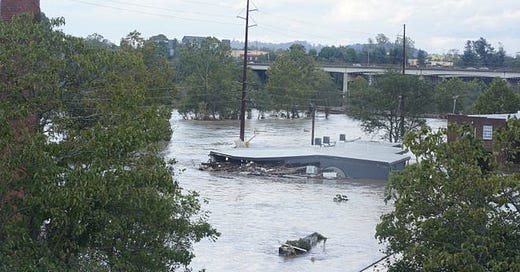When we came home from Asheville last weekend, I texted my friend Elaine, “I am so glad you live in a beautiful city.” Elaine is my dear friend from graduate school in California, who moved years ago from St. Augustine to Asheville, so it always feels special to visit her or be visited her. I never expected we’d wind up in the same state.
Six years ago, she sheltered my family during Hurricane Florence. A few days before Florence hit the coast, I saw my friend Sarah, a South Florida native, at a party, and she told me her family was evacuating to Florida. To leave central NC for Florida during a hurricane was counterintuitive—but who did I know who was better at tracking storms than Sarah? We immediately made plans to go west. Harriet was just five months old then, and from Elaine’s rain-lashed house on the mountainside I tracked the rising rivers back home.
Asheville, and Appalachia generally, is sometimes talked about as a a climate haven, or a climate refuge for people fleeing coastal cities or migrating from places like California or Texas. It’s less susceptible to heat waves and droughts and fires. Hundreds of miles from the coast, it should be insulated from hurricanes and tropical storms.
But today all of western NC is a major disaster zone, cut off from the rest of the state as roads crumbled in landslides and washouts caused by Tropical Storm Helene. The rivers have flooded, power is out, and cell service is very spotty. Chimney Rock is under water. My friend Catey will load up her car with water and food and try to reach her child, a student at UNC-Asheville, but has no idea if she can get there and no way to speak to them. This must be true for many parents, relatives, friends waiting on word from their loved ones.
We will be thinking all day about Catey, Elaine, Z, Endy, Ken, Wilton, and all our dear ones out west. Also the people in Nepal affected by the deadly flooding that has killed more than a hundred people there.
All of this destruction and death intensified by climate change.
If you can donate to help in NC, local journalist Barry Yeoman suggests these charities:
The American Red Cross of North Carolina has opened shelters all over the region. Learn more here and donate here.
Many religious groups have disaster relief organizations. This includes the Western North Carolina Conference of the United Methodist Church. Donate here.
Day One Relief, based in Chapel Hill, quickly moves resources to local grassroots groups after a disaster. Donate here.
The all-volunteer Next Level Disaster Response, based in Iron Station, offers post-disaster services from chainsaw operations to counseling. Donate here.
I will be waiting (patiently) for Elaine’s next letter from Stranger and Stranger. She calls it a “shelf for poetic attention” and it is one of my favorite reads every week.
Today we will be canvassing for Democrats in Creedmoor, then talking about Public School Strong’s top priorities for Chatham County at the Pepper Fest in Pittsboro. These include upholding Governor Cooper’s veto of HB 10, the damaging giveaway of public school dollars to private school families of any income; the election of public schools champion Mo Green; and the reelection of longtime educator David Hamm for Chatham County School Board.
We have things to share—reading lists, a yarn craft—which we hope we will be able to manage before next week. Stay safe and lots of love, as always, from us at the FTT.





Hello Belle. So you know, we are all fine and our house is fine. Love to you all. Ken
Hello to Elaine! and hopeful for her safety and that of her loved ones and all affected. H